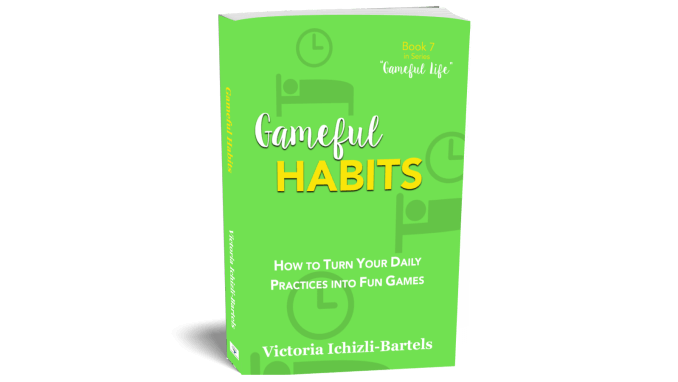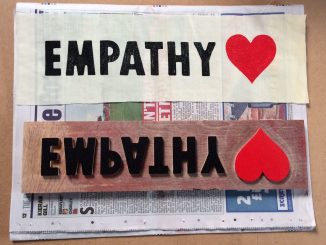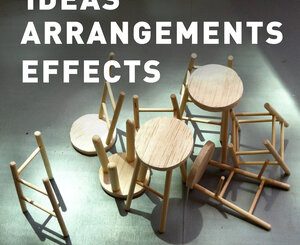
Victoria Ichizli-Bartels is the author of numerous books on different facets of her ‘Self-Gamification’ approach to turning one’s life into games – for enjoyment, motivation and achievement. Using a combination of Kaizen (small continuous improvements), an anthropological approach to self-reflection and gamification, self-gamification opens up possibilities for helping oneself in countless areas of one’s life. While Victoria has already specific guides to some of these – from using it as a tool for increasing productivity and quality in writing, to coping with the isolation of lockdown and working with one’s subconscious, the opportunities for self-help and growth of this approach are probably only limited by one’s ingenuity as a ‘game designer’ and desire to progress in a particular area.
This book, ‘Gameful Habits’ is number seven in the series entitled ‘Gameful Life’, and focuses, as you might expect, on the acquisition, and maintenance of beneficial habits.
Although many of you reading this, because you are reading it in Ludogogy, probably have some, or a lot, of experience in games design, for others it might feel a bit daunting that Victoria’s idea is to turn them into designers of games in order to achieve whatever it is that they want. So it is important to note that she stresses, right at the start of the book, that practising self-gamification will allow you to achieve flow and fun (and get stuff done) without having to study games design, or psychology, in detail.
Victoria also mentions that she, like many of us, over the last year or two, has been inspired by James Clear’s ‘Atomic Habits’. So, what does her book have to offer us that this very popular work does not?
I believe it is a useful complement to Clear’s work, and those with an interest in using their capacity to form habits to better their lives, could benefit from having both of these books in their ‘to read’ pile. Clear’s book is great for the ‘why’ of habits – as well as being very practical. Victoria’s book is completely practical, but has the added advantage of being about the fun, happiness and flow that can be achieved when you gamify yourself and your habits.
While there are obviously many, many different habits that people might want to apply this approach to, in this book, Victoria chooses to describe her experience with just one – applying self-gamification to the desired habit of getting enough sleep. I personally liked this way of approaching the topic. It enables the reader to really get to the heart of the methods, without having to process multiple different examples of application.
And don’t worry if you struggle with working out how you might adapt the ‘Super Sleeper Game’ to drinking enough water, your exercise routine or anything else. Chapter 11 is entitled ‘Extrapolating Super Sleeper to other Super Habit Games’ and gives you plenty of raw material for designing your own games, including ideas for scoring and rewarding oneself.
In a time when many of our behaviours are gamified by those who may want us to behave or act in ways beneficial to them – from purchasing habits, to social (media) interaction and even how we perform work tasks, Victoria’s approach represents a more benign side to gamification, showing how it can be applied with kindness, and most importantly with autonomy, because with self-gamification, you are both the player and designer of your own life-games.
If you are interested in finding out more about Victoria’s approach, you can visit her site at https://www.victoriaichizlibartels.com/ or of course, you can read the articles which she has contributed to Ludogogy at https://www.ludogogy.co.uk/author/victoriaib/
Gameful Habits: How to Turn Your Daily Practices into Fun Games is available on Amazon
- James Bore – The Ransomeware Game - 13th February 2024
- Ipsodeckso – Risky Business - 23rd January 2024
- Review – Luma World Games - 15th December 2023





Thank you very much for this great review of Gameful Habits, Sarah!
It distills the ideas behind the book brilliantly. I am thrilled that you enjoyed it.
Thank you for highlighting my message that anyone can turn their lives and habits into fun games, also those who never thought of diving into game design or psychology. Games are a great source of inspiration, and they are present everywhere around us. When approached with awareness and incrementally, they can empower us immensely and boost our resourcefulness, productivity, motivation, drive, and experience of joy and fun without trying to force the outcome in any way.
Thank you again for reviewing Gameful Habits and sharing it with Lugogogy readers. I will be happy to answer any questions about the book and the topics it covers.